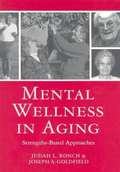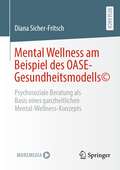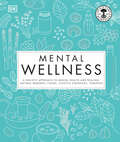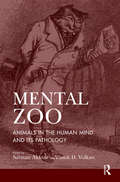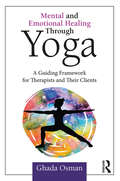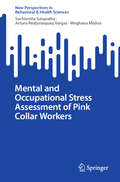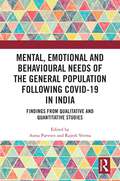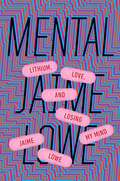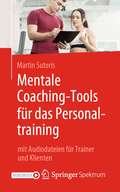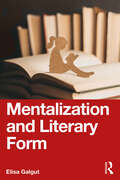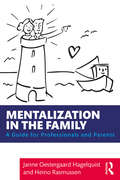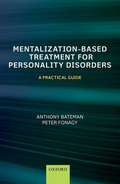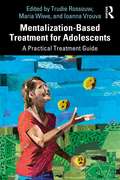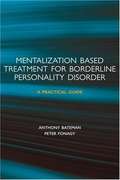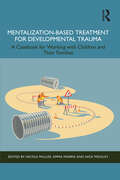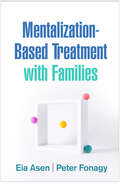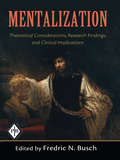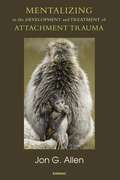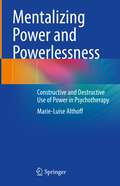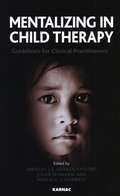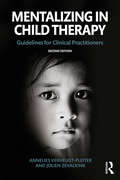- Table View
- List View
Mental Wellbeing and Psychology: The Role of Art and History in Self Discovery and Creation (Advances in Mental Health Research)
by Sue BarkerMental Wellbeing and Psychology unpacks the philosophical and psychological need to understand ourselves through an exploration of historical archives and artistic creativity. This focuses on some practical, evidence-based approaches to developing mental wellbeing. The book uses phenomenological psychology to explore the materials developed by the Stiwdio Arts group and offers an understanding of one’s experiences of their world, recognising that these are embodied and perceived within a temporal and relational place. It offers examples for developing mental health and wellbeing interventions for charities, private care and the NHS. It provides an evidence base for the use of creativity and historical resources in mental health care. This book will be of great interest for academics, researchers and post-graduate students in the field of mental wellbeing, nursing and mentalhealth nursing, occupational therapy and social work.
Mental Wellness In Aging: Strengths-Based Approaches
by Judah L. Ronch Joseph A. GoldfieldContains 16 chapters addressing the use of strengths- based interventions for working with the growing population of older adults. Includes detailed, useful case studies and innovative strategies for engaging older adults' strengths in a variety of settings and for working with older adults in therapy.
Mental Wellness am Beispiel des OASE-Gesundheitsmodells©: Psychosoziale Beratung als Basis eines ganzheitlichen Mental-Wellness-Konzepts
by Diana Sicher-FritschDas vorliegende Buch beschäftigt sich mit dem OASE-Gesundheitsmodell welches Wellness und Gesundheit mit psychosozialer Beratung kombiniert und im Bereich Mental Wellness seinen Einsatz findet. Ziel ist eine nachhaltige Gesundheitsprävention, welche das Spannungsfeld zwischen Belastbarkeit und gefühlter sowie realer Belastung minimiert. Die Ganzheitlichkeit des Konzepts ist der zentrale Aspekt der Forschung. Untersucht wird die Kombination von Gesundheitsbehandlungen aus dem klassischen Wellness mit psychosozialer Beratung, unter Berücksichtigung von Ernährung und Bewegung in Ergänzung mit med. Biofeedback-Anwendungen. Die Forschungsergebnisse zeigen die Bedeutung der Kombination von mentaler, emotionaler und körperlicher Gesundheit für ein ganzheitliches, nachhaltiges Wohlbefinden, bei dem die Prävention im Vordergrund steht.
Mental Wellness: A holistic approach to mental health and healing. Natural remedies, foods...
by DK Neal's Yard RemediesAn authoritative guide on natural approaches to boost everyday mental wellness and provide extra support when you need it the most.This mental wellness book helps you manage stressful periods as well as other biological factors that impact your mental wellbeing. You&’ll learn how to boost and holistically balance your mental state using natural remedies. Neal&’s Yard Remedies: Mental Wellness is filled with holistic techniques, herbal remedies, essential oils, foods, exercise, lifestyle strategies, and therapies to empower you. This book offers: • The most comprehensive compendium of natural remedies for mental wellness on the market • Chapters on herbal remedies, aromatherapy, foods (including supplements), movement, and alternative therapies • A Symptom Checker which you can explore symptoms and access solutions in the book, based on your current need – jitteriness; anxiety attacks; acute stress; grief; low mood, etc • Approaches and information endorsed by Neal&’s Yard Remedies, world leaders in natural, organic, holistic health. Learn techniques and mantras for uplifting your mood This beautiful, enlightening book explores how things like the environment, the seasons, hormonal shifts, sleep quality, and gut health can influence your mental health. Delve into how lifestyle choices can inhibit your mental health such as caffeine, alcohol, smoking, pollution, screen time, and isolation from the community. This wellness guide offers uplifting and informed information on why you may experience stress and anxiety, providing you with reassurance and strategies to combat these feelings. Explore the science behind natural remedies and use this book as a reliable resource for advice on mindfulness, yoga, breathing exercises, acupuncture, herbal remedies, and reiki.Expand your wellness collectionThis series of wellness books explore natural, holistic remedies to boost physical and psychological health and help you find the best solutions for yourself! Other titles in this series include Neals Yard Remedies Essential Oils and Neal&’s Yard Remedies Complete Wellness.
Mental Zoo: Animals in the Human Mind and its Pathology
by Salman Akhtar Vamık D. VolkanThis book offers a detailed and thorough perspective on the psychological meanings of animals to human beings and on their role in the development of the human mind and its psychopathology. It presents a multitude of new observations on human interactions with animals.
Mental and Emotional Healing Through Yoga: A Guiding Framework for Therapists and their Clients
by Ghada OsmanMental and Emotional Healing Through Yoga combines key research on the intersection of yoga and mental health with a client-centered, step-by-step framework that can be applied to a range of complex mental and emotional disorders. The book guides readers through the initial intake of the first client session and the development of subsequent sessions, providing case examples from the author’s practice to show how yoga’s mind-body connection facilitates recuperation and healing. While well-grounded in research and case studies, the book is also highly readable, making it accessible to professionals such as psychotherapists and yoga therapists, as well as individuals and families struggling with mental health issues.
Mental and Occupational Stress Assessment of Pink Collar Workers (New Perspectives in Behavioral & Health Sciences)
by Arturo Realyvásquez Vargas Suchismita Satapathy Meghana MishraThis book delves into the mental and occupational stress of pink-collar workers. A pink-collar worker is a person employed in a care-related profession or in an area that has traditionally been seen as the domain of women. Examples include jobs in the beauty business, nursing, social work, education, teaching, secretarial work, upholstery, or child care. To help with the financial burdens of their family, pink-collar workers engage in their job for at least 8 to 10 hours a day, which often leads to sacrificing their time with their family. Additionally, pink-collar works face many barriers like emotional labor (e.g., dealing with patients or clients), workload, interpersonal conflicts, and job insecurity. This book endeavors to study the physical stressors and mental stress of pink-collar workers so that new policies can be framed or suggested for the wellness of pink-collar workers.
Mental, Emotional and Behavioural Needs of the General Population Following COVID-19 in India: Findings from Qualitative and Quantitative Studies
by Rajesh Verma Asma ParveenMental, Emotional and Behavioural Needs of the General Population Following COVID-19 in India: Findings from Qualitative and Quantitative Studies explores the psychological challenges arising from COVID-19 that impacted the Indian general population. The book contains comprehensive research, conducted during and post-pandemic, on economic, social, psychological and health factors in the context of recovery, handling, coping and resilience. It also offers practical approaches for reproducing results and outcomes. These studies unmask several challenges, coping mechanisms and interventions adopted by the general population.The book covers a wide range of mental health domains, including offering insight into the impact of COVID-19 on the mental health status of those who have sustained the atrocities of cross-border terrorism and mass migration for more than three decades, and can still find meaning in life.The book navigates the complexities of risk factors and digital mental health interventions along with understanding the experiences of the general population through the lens of cultural narrative. It explores the social stigma, transitional impact and ruminative experiences of people who passed through the psychological grinding times and paves the way for effective interventions and resilience-building strategies in the post-pandemic era.It is a valuable reading for researchers, mental health practitioners, policymakers and educators to learn about the most recent developments, concerns, real-world difficulties encountered and solutions taken in the mental health field following COVID-19, as well as offering implementable methods for replication.
Mental, Emotional, and Behavioural Health Needs of Specific Populations following COVID-19 in India: Findings from Qualitative and Quantitative Studies
by Rajesh VermaThe book Mental, Emotional, and Behavioural Needs of Specific Populations following COVID-19 in India: Findings from Qualitative and Quantitative Studies reviews quantitative and qualitative research, conducted during and post-pandemic, on economic, social, psychological, and health factors across diverse, specific populations in India. It studies numerous psychological elements of COVID-19 in the context of recovery, handling, coping, and resilience and offers practical approaches for reproducing results and outcomes.The book includes predictors of mental well-being across women survivors, students, migrant women, and neurodivergent populations. Chapters focus on a wide range of themes including the mental health of Border Security Force personnel during COVID-19 and issues of women’s violence and mental health problems amongst poor and migrant workers after COVID-19. The book also throws light on sensitive and beneficial topics such as experiences of a mother of an autistic child and the strengthening of LGBTQIA+ mental health through personal growth initiatives.It is valuable reading for researchers, mental health practitioners, policymakers, and educators to learn about the most recent developments, concerns, and real-world difficulties encountered, and solutions taken in the mental health field following COVID-19, as well as offering implementable methods for replication.
Mental: Lithium, Love, and Losing My Mind
by Jaime LoweA riveting memoir and a fascinating investigation of the history, uses, and controversies behind lithium, an essential medication for millions of people struggling with bipolar disorder. It began in Los Angeles in 1993, when Jaime Lowe was just sixteen. She stopped sleeping and eating, and began to hallucinate—demonically cackling Muppets, faces lurking in windows, Michael Jackson delivering messages from the Neverland Underground. Lowe wrote manifestos and math equations in her diary, and drew infographics on her bedroom wall. Eventually, hospitalized and diagnosed as bipolar, she was prescribed a medication that came in the form of three pink pills—lithium.In Mental, Lowe shares and investigates her story of episodic madness, as well as the stability she found while on lithium. She interviews scientists, psychiatrists, and patients to examine how effective lithium really is and how its side effects can be dangerous for long-term users—including Lowe, who after twenty years on the medication suffers from severe kidney damage. Mental is eye-opening and powerful, tackling an illness and drug that has touched millions of lives and yet remains shrouded in social stigma. Now, while she adjusts to a new drug, her pursuit of a stable life continues as does her curiosity about the history and science of the mysterious element that shaped the way she sees the world and allowed her decades of sanity. Lowe travels to the Bolivian salt flats that hold more than half of the world’s lithium reserves, rural America where lithium is mined for batteries, and tolithium spas that are still touted as a tonic to cure all ills. With unflinching honesty and humor, Lowe allows a clear-eyed view into her life, and an arresting inquiry into one of mankind’s oldest medical mysteries.
Mentale Coaching-Tools für das Personaltraining: mit Audiodateien für Trainer und Klienten
by Martin SutorisDieses Buch ist eine praxisnahe Fortbildung für Personal Trainer, Ernährungsberater, Trainer bzw. Coaches verschiedener Sportarten, Life Coaches, Burnout-Berater und andere trainierende sowie beratende Berufe. Ihnen werden erprobte und bewährte psychologische Methoden an die Hand gegeben, mit denen Sie Ihre Kunden zu mehr Erfolg führen können. Als Personal Trainer oder Berater sind Sie gut in Ihrem Fach und können Know-how vermitteln. Doch wer seine Kunden zu langfristiger Veränderung, nachhaltiger Zielerreichung, mehr Motivation und effektiverer Disziplin führen will, der sollte vor allem die Psyche in diese Arbeit einbinden. Wie das genau geht, erfahren Sie hier von einem erfahrenen Coach. Vorgestellt werden exakt für Personal Trainer und andere Berater abgestimmte Methoden, die einfach zu erlernen, gut anwendbar und schlicht erfolgssteigernd wirken: Mentaltraining, psychologische Beratung, NLP, Lösungsfokussierung, Motivationstechniken, Kommunikationstricks.
Mentalization and Literary Form
by Elisa GalgutThis book examines the ways in which literary form facilitates mentalization and our ability to be aware of our own and others’ mental states, showing how we can use this awareness to make sense of our experiences and interactions.Looking at narrative, the sonnet, free indirect speech, and autobiographical memory, Elisa Galgut focuses on the ways in which literary form not only contains difficult emotions, but how it shapes and develops these emotional states. She considers how the creative mind gives form to inchoate emotions and structures and processes them in ways that allow us to experience and give name to what was previously unclear and amorphous. Looking at the work of canonical figures of English literature, such as Shakespeare, Milton, and Austen, Galgut’s focus on form – rather than content – offers the reader a novel way of understanding the ways in which literature engages our emotional lives.Assuming no prior knowledge of complex psychoanalytic concepts, Mentalization and Literary Form is aimed at academic and graduate students focusing on literary studies and philosophy, as well as psychoanalysts interested in Literature.
Mentalization in the Family: A Guide for Professionals and Parents
by Janne Oestergaard Hagelquist Heino RasmussenMentalization in the Family draws upon the latest research on child development, parenting, and mentalization theory to provide a comprehensive guidebook for parents, teachers, social workers, and any professional working with families today. The book explains the core concepts of mentalization, an idea whereby an appreciation of internal mental states, both those of others and oneself, can lead to an understanding of overt behaviour. It explores key ideas central to this – such as attachment style, internal regulation, emotional compass, and parental navigation – but also offers practical guidance around issues such as play, siblings, boundaries, and sexuality. Accessibly written throughout and featuring pedagogical tools that bring the theory into life, this wide-ranging book will be essential reading for a range of professionals, from those working with foster families to teachers working with troubled or disruptive children. It also offers a way for parents to better understand themselves, their own parenting style, and the dynamics which make up family life.
Mentalization with Neglected and Traumatized Children
by Janne Oestergaard HagelquistMentalization with Neglected and Traumatized Children provides a comprehensive walkthrough of the impact on child development as a result of neglect and trauma, and how theories of mentalization can help. First providing a thorough overview of the concept of mentalization, Janne Oestergaard Hagelquist shows how one can have productive and mentalizing interactions with neglected and traumatized children and adolescents, as well as how to apply the more current knowledge about mentalization and trauma in the treatment of these children. This book provides specific educational tools and pedagogical models aimed at supporting the daily work of a professional working with children, adolescents, or families. Concepts and tools of mentalization are presented in a reader-friendly and easy-to-use way and are supported by case studies and clinical vignettes throughout. The book is essential reading for professionals working with neglected and traumatized children, such as psychoanalysts, psychotherapists, social workers, pedagogues, teachers, and foster carers, as well as those interested in mentalization, trauma, and child development.
Mentalization-Based Treatment For Personality Disorders: A Practical Guide
by Peter Fonagy Anthony BatemanMentalizing - the ability to understand oneself and others by inferring mental states that lie behind overt behaviour - develops within the context of attachment relationships. It is crucial to self-regulation and constructive, intimate relationships, both of which are impaired in personality disorders because of sensitivity to losing mentalizing at times of anxiety and attachment stress. Loss of mentalizing leads to interpersonal and social problems, emotional variability, impulsivity, self-destructive behaviours, and violence. This practical guide on mentalization-based treatment (MBT) of personality disorders outlines the mentalizing model of borderline and antisocial personality disorders and how it translates into clinical treatment. The book, divided into four parts - the mentalizing framework, basic mentalizingpractice, mentalizing and groups, and mentalizing systems - covers the aims and structure of treatment, outlines how patients are introduced to the mentalizing model so that their personality disorder makes sense to them, explains why certain interventions are recommended and others are discouraged,and systematically describes the process of treatment in both group and individual therapy to support more stable mentalizing. People with personality disorders commonly have comorbid mental health problems, such as depression and eating disorders, which complicate clinical treatment. Therefore, the book advises the clinician on how to manage comorbidity in treatment. In addition, mentalizing problems in families and social systems, for example, schools and mental health services are also covered. A families and carers training and support guide is provided as families and others are often neglected during the treatment of people with personality disorder. The book is a valuable guide for all mental health workers on how to effectively treat personality disorders.
Mentalization-Based Treatment for Adolescents: A Practical Treatment Guide
by Trudie RossouwMentalization-Based Treatment for Adolescents (MBT-A) is a practical guide for child and adolescent mental health professionals to help enhance their knowledge, skills and practice. The book focuses on describing MBT work with adolescents in a practical way that reflects everyday clinical practice. With chapters authored by international experts, it elucidates how to work within a mentalization-based framework with adolescents in individual, family and group settings. Following an initial theoretical orientation embedded in adolescent development, the second part of the book illuminates the MBT stance and technique when working with young people, as well as the supervisory structures employed to sustain the MBT-A therapist. The third part describes applications of MBT-A therapies to support adolescents with a range of presentations. This book will appeal to therapists working with adolescents who wish to develop their expertise in MBT as well as other child and adolescent mental health professionals.
Mentalization-Based Treatment for Borderline Personality Disorder: A Practical Guide, First Edition
by Peter Fonagy Anthony W. BatemanMentalization-based treatment for borderline personality disorder is a 'How to Do It' book outlining a clinically proven treatment for Borderline Personality Disorder. Containing illustrative clinical examples, it details precisely how to develop and implement treatment and is a companion to the highly successful book Psychotherapy for Borderline Personality Disorder - mentalization based treatment. This practical guide explains how to treat borderline patients by helping them develop a more robust mentalizing capacity within the context of an attachment relationship. It provides the practitioner with everything they need to know about how to practice mentalizing treatment in day patient and out-patient settings. Enough theory is provided to orientate the clinician and there is step-by-step practical advice on the assessment of mentalizing and interpersonal relationships, how to structure treatment, the use of basic mentalizing interventions and how to apply them, as well as information on what not to do. In addition, it includes a check list to be used in the assessment of mentalizing and a self-rating exercise for practitioners to evaluate their adherence to mentalizing.
Mentalization-Based Treatment for Developmental Trauma: A Casebook for Working with Children and Their Families
by Nicole MullerMentalization-Based Treatment for Developmental Trauma offers mental health practitioners a transdiagnostic model to support the needs of traumatized children with both internalizing (emotional) and externalizing (behavioural) difficulties, and shows how MBT can be applied to meet the needs of children who have experienced various types of developmental trauma.This volume includes contributions from global experts in MBT who share their experience of using the method with traumatized children in a range of settings, from individual therapy to group work and work with parents, carers, and the networks around the child. They highlight the benefits of using MBT with different groups, such as children in foster or residential care or those who are refugees. The chapters offer a framework for clinicians to support children to better process and regulate their emotions, highlighting the importance of early intervention as a means of mitigating certain psychopathologies that commonly result from developmental trauma. With clinical vignettes throughout, this book covers different stages of treatment, such as assessment, direct therapy with the child, work with the network and support for carers and parents.This book is a vital resource for child counsellors, psychologists, psychoanalysts and therapists who work with children who have experienced developmental trauma, as well as junior psychologists and child psychiatrists, mental health nurses, social workers and others working in child mental health services.
Mentalization-Based Treatment with Families
by Peter Fonagy Eia AsenExamining clinical practice with families through a mentalizing lens, this innovative book is filled with practical therapeutic strategies and in-depth case illustrations. The expert authors focus on ways to help parents, children, and adolescents to overcome blocks in how they relate to one another by gaining a deeper understanding of--and openness to--each other's experiences and points of view. The volume draws on the empirically supported mentalization-based treatment (MBT) model and interweaves it with systemic concepts and interventions. It includes guidance for setting up sessions and engaging clients; addressing emotional and behavioral difficulties that frequently lead families to seek treatment; and implementing playful activities, exercises, and games that equip family members to change problematic relationship patterns.
Mentalization: Theoretical Considerations, Research Findings, and Clinical Implications (Psychoanalytic Inquiry Book Series #Vol. 29)
by Fredric N. BuschMentalization is the capacity to perceive and interpret behavior in terms of intentional mental states, to imagine what others are thinking and feeling, and is a concept that has taken the psychological and psychoanalytic worlds by storm. This collection of papers, carefully edited by Fredric Busch, clarifies its import as an essential perspective for understanding the human psyche and interpersonal relationships. The book is divided into theoretical, research and clinical papers, reflecting how the investigators thoughtfully and purposefully pursued each of these goals. Those involved in identifying mentalization have also made consistent efforts to measure and research the concept. Thus, in addition to expanding the theoretical bases and implications of mentalization and identifying clinically useful applications, the authors describe research that scientifically grounds the concept. Mentalization addresses and expands upon a number of implications of mentalization. These include: What are the broader implications for mentalization with regard to social and evolutionary development? How does mentalization interdigitate with other psychoanalytic models? How is mentalization systematically assessed? What clinical correlates have been found? How do we understand variations in the capacity for mentalization, even within a given individual? What are the applications of mentalization in the clinical arena, including specific disorders? Readers of this volume will find their clinical work to be more productive and their view of the human psyche broadened.
Mentalizing In the Development and Treatment of Attachment Trauma
by Jon G. AllenThis book brings together the latest knowledge from attachment research and neuroscience to provide a new approach to treating trauma for therapists from different professional disciplines and diverse theoretical backgrounds. The book is not only an essential resource for psychotherapists and counselors but also an ideal guide to give to clients to help them understand their condition and the process of healing.
Mentalizing Power and Powerlessness: Constructive and Destructive Use of Power in Psychotherapy
by Marie-Luise AlthoffIn this book, the author discusses with a view to psychotherapeutic practice how power and the exercise of power can be used in a constructive sense. Spontaneously, people tend to associate the topic of power negatively. They mostly talk about their own powerlessness and the power of "those up there", and very rarely about their own striving for power. It is undisputed that power and the exercise of power, as well as dealing with powerlessness, play an important role in psychotherapy. Nevertheless, the constructive and destructive aspects of power are still too little reflected. Here, there is a mentalization deficit on the part of both psychotherapists and patients. In this book questions are asked and suggestions for practice are developed. Written for psychological psychotherapists, child and adolescent psychotherapists, family therapists, counselors, psychiatrists, physicians, students, and psychotherapists in training.
Mentalizing in Arts Therapies
by Marianne VerfailleThis book describes the use of therapeutic art, music, and dance interventions against a background of mentalization, thus forging a link between arts therapies and mentalization-based treatment. This book has its roots in the theory of Mentalization Based Treatment by Antony Bateman and Peter Fonagy, and combines the broad experience of many art therapists with art, music and dance/movement therapy in psychiatric settings in the treatment of adults and adolescents both individually and in groups, as well as children with disorganised attachment. As a treatment concept, mentalization is quite straightforward because mentalizing is a typically human ability. As Bateman and Fonagy (2012) say: "Without mentalizing there can be no robust sense of self, no constructive social interaction, no mutuality in relationships, and no sense of personal security". On the other hand, it is not so simple to fully grasp the significance of mentalization. Mentalization-based therapy is a specific type of psychotherapy designed to help people reflect on their own thoughts and feelings and differentiate them from the perspectives of others.
Mentalizing in Child Therapy: Guidelines for Clinical Practitioners
by Jolien Zevalkink M. G. L. Schmeets Annelies J. E. Verheugt-Pleiter J. E. Verheugt-PleiterPsychoanalysis has always been a developing field. For the treatment of children whose development has come to a standstill, mentalization-based child therapy-previously known as developmental therapy-is the latest branch on this tree of knowledge. A combination of data from psychoanalysis, infant research, attachment research and neurobiology was of decisive significance in reaching this point. It is becoming clear that neurobiological processes can very well be understood on the basis of psychoanalytic frameworks. These new insights into people's mental functioning also serve to foster collaboration, resulting in an integration of the more relationship-oriented treatments and the more competence-oriented treatments. This book will fill a growing need in mental health care for children and young people: integrated treatment, that is, using several different modes of treatment at the same time when the problems are complex. Treating complex problems in children with new psychoanalytic techniques is expected to add a new dimension to the practice of treatment, one that is interesting to cognitive behavioral therapists and psychoanalytically schooled psychotherapists alike. One step further, mental health care for children and adolescents may well draw benefits from the achievements of psychoanalysis, thus embedding psychoanalysis more firmly in the field of mental health care. To achieve this, not only will the various forms of psychotherapy need to be integrated, but the therapists as well.
Mentalizing in Child Therapy: Guidelines for Clinical Practitioners
by Jolien Zevalkink Annelies Verheugt-PleiterMentalizing in Child Therapy focuses on open-ended psychotherapy for children with complex mental health issues and attachment problems. It offers examples of personalized and integrated treatment that is "firm in structure yet flexible in its focus" (Peter Fonagy, foreword to first edition). The book is based on the systematic observation of the treatment of complex problems in children (4-12 years) using a mentalizing therapeutic stance and a range of techniques to enhance mentalizing abilities and trust in other people, incorporating aspects of the more relationship-oriented and competence-oriented treatments. In this updated edition, the authors have elaborated on the topic of attention regulation, having included Siegel’s concept of the ‘window of tolerance’. They’ve also written more on the mentalizing abilities of the therapist, the importance of providing structure at the beginning of the treatment, and the value of communication for developing epistemic trust. Featuring guidelines for clinical practitioners, this book is important for the clinical training of child psychotherapists, as well as for professional child psychiatrists, child psychologists and other therapists working with four to 12-year-old children experiencing significant developmental problems with mentalizing.

